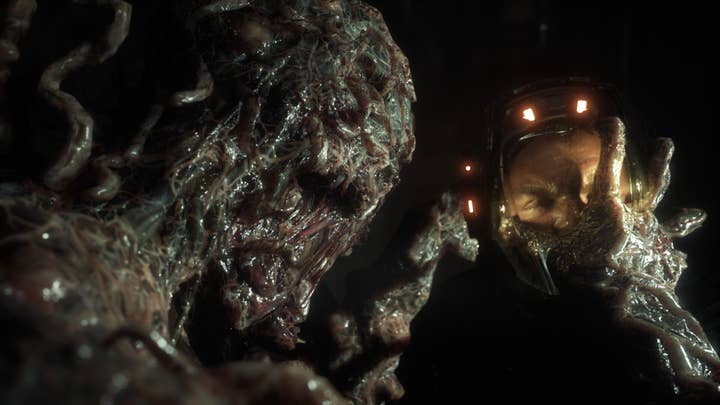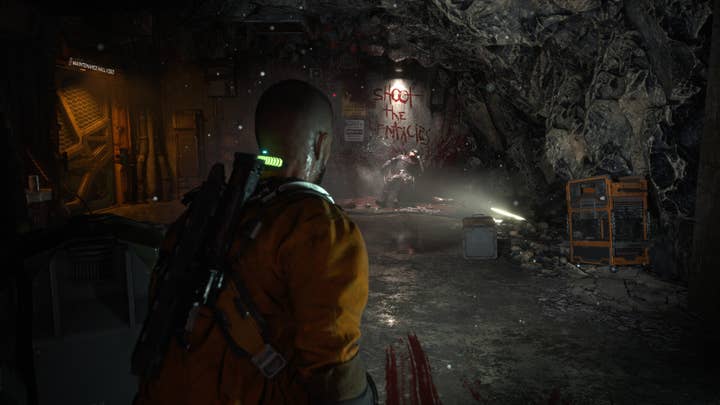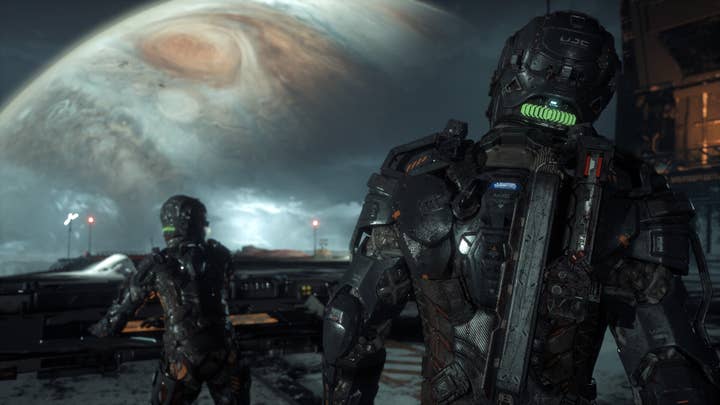Callisto Protocol developers left out of credits
Former Striking Distance employees estimate around 20 omitted from game's credits roll, including senior devs and key contributors
Last month's release of The Callisto Protocol was supposed to be an unmitigated victory for Striking Distance Studios, the culmination of a story that began with the studio's creation in 2019.
But it was a bittersweet milestone for many who worked on the game, as The Callisto Protocol's release also marked their first look at its conspicuously incomplete credits.
GamesIndustry.biz has spoken with five former Striking Distance Studios developers who were omitted from the game's credits, and say they've got plenty of company. Separate sources estimate roughly 20 people across a variety of departments were left off the game's credits.
A Striking Distance representative did not return a request for comment.
"It definitely stings," one source says. "It sucks. I made a good amount of contribution and worked on it for [a length of time]. To just not be there at all is shitty."
"I made a good amount of contribution... To just not be there at all is shitty"
While it's not unheard of for developers who leave a project before completion to be left out of the credits, our sources confirm that the studio had no such policy that was ever communicated to employees, and none of the people we speak with consider The Callisto Protocol's omissions normal.
One describes them as "egregious," leaving off some senior developers, leads, and directors who made significant contributions, including people who had worked at Striking Distance for over a year, or had history working with Striking Distance CEO Glen Schofield at his previous studio, Sledgehammer Games. Another described some of those left off the credits as "really core people who built the studio up."
"I understand if a contractor does a small amount of work for a few months and is left off, but we're talking full-time employees with over a year invested in the title, and had a hand in significant parts of the product," one developer says. "That's where the surprise has come from for a lot of us."

Our sources also collectively pointed to an inconsistency in the way Striking Distance doled out credits. Some former employees were included in the credits as "additional" help in their departments, some were grouped in a "Miscellaneous" category at the very end of the nearly 20-minute credits roll, and others were left off entirely.
"There was definitely some amount of playing favorites with the people who got credited," one source tells us. "My impression is that they pretty much picked people they liked or had some sort of relationship with, and those would get credit and the others wouldn't."
(The International Game Developers Association crediting standards call for credits for any team member who worked for the company for a minimum of 30 days, including contractors, and to retain the names of staffers who leave before launch.)
For many of our sources, the omission added insult to injury. Last year as development on the game was wrapping up, Schofield was roundly criticized for posting on social media about how proud he was that the team was working 12-15 hour days, 6 or 7 days a week, despite exhaustion and even COVID.
Schofield later deleted that post, saying the company values "passion and creativity, not long hours." Regardless, many we speak with say long hours were part of the job."It's a pretty intense culture of delivering and putting in those crunch hours, which is fine," one developer says of working at Striking Distance. "Game dev can be intense, especially delivering a product of this magnitude, you don't always strike the best work-life balance. My issue is those of us who took part in that culture, who put in that time, and worked intensely to help craft this product, were punished with a credit omission for not going the extra mile… to stay until it shipped."
Most of the people we speak with (but not all) say they crunched on the game as management pushed to go beyond AAA and make what they called a "Quad A" game. One tells us it was particularly bad as the team was rapidly staffing up during the pandemic, roughly doubling the team size in three months in a process that required near-constant meetings to ensure everyone was on the same page.
Designers I know were working 10 hours a day just in meetings. Then they had to crunch just to basically do the work they had to do
"Designers I know were working 10 hours a day just in meetings," one source says. "Then they had to crunch just to basically do the work they had to do."
Striking Distance management presented itself as having a "people first" mentality, but even when management would acknowledge the crunch and promise to address it, it might come in the same meeting where they praised people for putting in long hours.
"There was always this misalignment, where on the surface they say one thing, and then almost always moments later say something to contradict that," one developer says.
Another agrees, saying management was quick to pay lip service to self-care, but less so to make accommodations for it.
"They're not giving you fewer tasks," they say. "It's the same amount of things to work on, yet they 'want you to take as much time as you need'? The policy is not to do overtime, but you're always doing overtime."

Some express additional concerns with the culture at the studio and the way it treats people on their way out the door.
"Whenever anyone would leave the studio, there would be no recognition of that person leaving," one says. "It's the only company I've ever worked at where you'd find out a week to a month later that someone on the team had left."
Another says the farewell emails standard at other studios were curiously absent.
"You never saw those emails," the developer says. "There were no emails like that. People were just leaving. 'Oh, what happened with so-and-so?' 'He's gone.'"
One source notes that there was considerable turnover at the studio in the fourth quarter of 2021 and speculates that management was worried that calling attention to departures would damage morale. Another simply describes the management circle as "vindictive."
"Somebody wanted to send a message, and the message was, 'Next time have a bit more loyalty to us'"
"I think the Sledgehammer guys like loyalty," a third source says. "And they can be punitive if they detect a lack of it… [The credits omission] felt like an obvious F-U to those who were left out. Somebody wanted to send a message, and the message was, 'Next time have a bit more loyalty to us.'"
Despite that, most of the people we speak with who were left off the credits were surprised by it, and did not expect the slight based on their past experience at the studio.
"I actually had a great time working there, and I felt I had a great relationship with everyone on the team, up to the C-staff and Glen," one source says. "I don't have anything bad to say about Glen… The only time there was some friction was on exit, and I think devs who left were punished with credit omissions."
Another echoed the sentiment, saying, "I did not have a bad time at Striking Distance. I very much liked my job, I liked the company, I liked the people I worked with, and I liked the game. I don't know if it was painless, but it was as smooth a transition out of it as there can be. I didn't think there would be any drama over it."
When asked if being left off the credits would keep them from recommending Striking Distance as an employer to their peers in the industry, one of our sources stops short of ruling it out, but adds, "I would want to have a conversation about it."
Sign up for the GI Daily here to get the biggest news straight to your inbox

